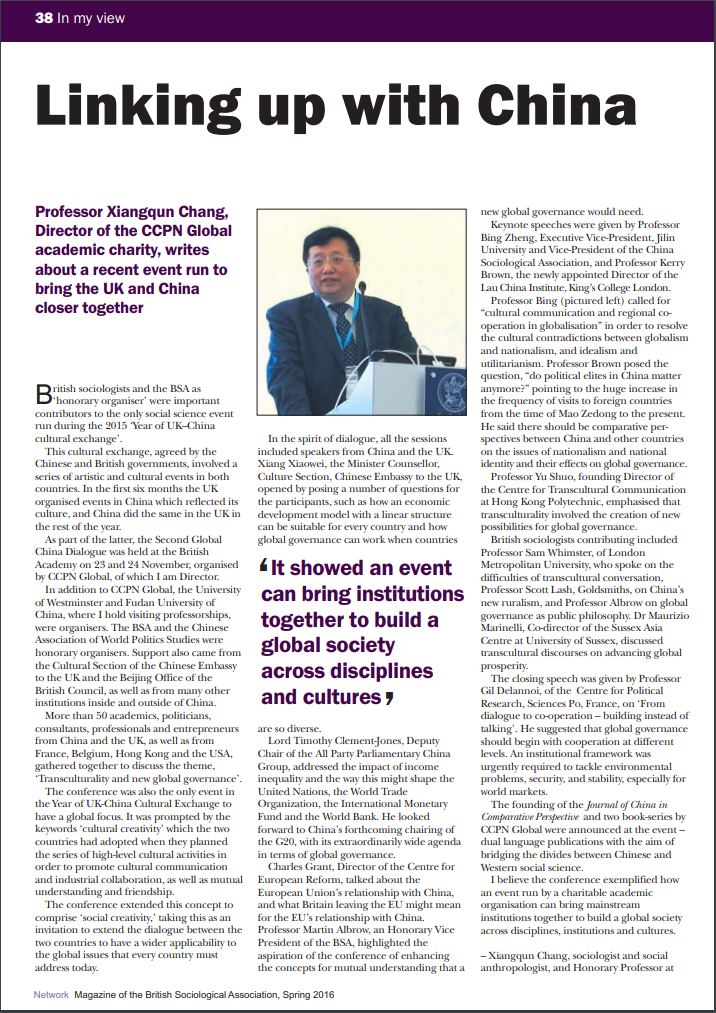Report on the second Global China Dialogue
Link up with China
Report on the second Global China Dialogue
Professor Xiangqun Chang, Director of the CCPN Global academic charity, writes about a recent event run to bring the UK and China closer together
British sociologists and the BSA as ‘honorary organiser’ were important contributors to the only social science event run during the 2015 ‘Year of UK–China cultural exchange’.
This cultural exchange, agreed by the Chinese and British governments, involved a series of artistic and cultural events in both countries. In the first six months the UK organised events in China which reflected its culture, and China did the same in the UK in the rest of the year.
As part of the latter, the Second Global China Dialogue was held at the British Academy on 23 and 24 November, organised by CCPN Global, of which I am Director.
In addition to CCPN Global, the University of Westminster and Fudan University of China, where I hold visiting professorships, were organisers. The BSA and the Chinese Association of World Politics Studies were honorary organisers. Support also came from the Cultural Section of the Chinese Embassy to the UK and the Beijing Office of the British Council, as well as from many other institutions inside and outside of China.
More than 50 academics, politicians, consultants, professionals and entrepreneurs from China and the UK, as well as from France, Belgium, Hong Kong and the USA, gathered together to discuss the theme, ‘Transculturality and new global governance’.
The conference was also the only event in the Year of UK-China Cultural Exchange to have a global focus. It was prompted by the keywords ‘cultural creativity’ which the two countries had adopted when they planned the series of high-level cultural activities in order to promote cultural communication and industrial collaboration, as well as mutual understanding and friendship.
The conference extended this concept to comprise ‘social creativity,’ taking this as an invitation to extend the dialogue between the two countries to have a wider applicability to the global issues that every country must address today.
In the spirit of dialogue, all the sessions included speakers from China and the UK. Xiang Xiaowei, the Minister Counsellor, Culture Section, Chinese Embassy to the UK, opened by posing a number of questions for the participants, such as how an economic development model with a linear structure can be suitable for every country and how global governance can work when countries are so diverse.
‘It showed an event can bring institutions together to build a global society across disciplines and cultures’
Lord Timothy Clement-Jones, Deputy Chair of the All Party Parliamentary China Group, addressed the impact of income inequality and the way this might shape the United Nations, the World Trade Organization, the International Monetary Fund and the World Bank. He looked forward to China’s forthcoming chairing of the G20, with its extraordinarily wide agenda in terms of global governance.
Charles Grant, Director of the Centre for European Reform, talked about the European Union’s relationship with China, and what Britain leaving the EU might mean for the EU’s relationship with China.
Professor Martin Albrow, an Honorary Vice President of the BSA, highlighted the aspiration of the conference of enhancing the concepts for mutual understanding that a new global governance would need.
Keynote speeches were given by Professor Bing Zheng, Executive Vice-President, Jilin University and Vice-President of the China Sociological Association, and Professor Kerry Brown, the newly appointed Director of the Lau China Institute, King’s College London.
Professor Bing (pictured left) called for “cultural communication and regional co-operation in globalisation” in order to resolve the cultural contradictions between globalism and nationalism, and idealism and utilitarianism. Professor Brown posed the question, “do political elites in China matter anymore?” pointing to the huge increase in the frequency of visits to foreign countries from the time of Mao Zedong to the present.
He said there should be comparative perspectives between China and other countries on the issues of nationalism and national identity and their effects on global governance.
Professor Yu Shuo, founding Director of the Centre for Transcultural Communication at Hong Kong Polytechnic, emphasised that transculturality involved the creation of new possibilities for global governance.
British sociologists contributing included Professor Sam Whimster, of London Metropolitan University, who spoke on the difficulties of transcultural conversation, Professor Scott Lash, Goldsmiths, on China’s new ruralism, and Professor Albrow on global governance as public philosophy. Dr Maurizio Marinelli, Co-director of the Sussex Asia Centre at University of Sussex, discussed transcultural discourses on advancing global prosperity.
The closing speech was given by Professor Gil Delannoi, of the Centre for Political Research, Sciences Po, France, on ‘From dialogue to co-operation – building instead of talking’. He suggested that global governance should begin with cooperation at different levels. An institutional framework was urgently required to tackle environmental problems, security, and stability, especially for world markets.
The founding of the Journal of China in Comparative Perspective and two book-series by CCPN Global were announced at the event – dual language publications with the aim of bridging the divides between Chinese and Western social science.
I believe the conference exemplified how an event run by a charitable academic organisation can bring mainstream institutions together to build a global society across disciplines, institutions and cultures.
– Xiangqun Chang, sociologist and social anthropologist, and Honorary Professor at UCL
Note: This report was published in the Network, the magazine of the British Sociological Association, in Spring 2016. The subtitle was added when posted here, for clarity.

Click here to return to the GCD II page
连接中国
——第二届全球中国对话报告
常向群教授,全球中国比较研究会会长,撰文介绍了近期举办的一个旨在拉近英国与中国的关系的活动
作为“荣誉主办单位之一”,英国社会学会是2015年举办的“中英文化交流年”中维一的社会科学活动的重要贡献者。根据中英政府的协议,“中英文化交流年”的英国文化季于上半年在中国举办,中国文化季于下半年在英国举办。在这个框架下, 笔者与同事们决定,第二届全球中国对话于2015年11月23及24日在英国学术院举行。
除了全球中国比较研究会,笔者分别担任客座教授的威斯敏斯特大学和特聘教授的中国复旦大学也是主办单位;除了英国社会学会之外,中国世界政治研究会也是荣誉主办单位。这项活动得到了来自中国驻英大使馆文化处和英国文化委员会北京办事处,以及很多国内外的机构的支持。50多位来自中国、英国、法国、比利时、香港和美国的学者、政治家、顾问、专业人士和企业家聚在一起,讨论“超文化与新型全球治理”议题。
这项活动也是中英文化交流年中唯一聚焦全球性事务的思想性交流活动。中英两国计划了一系列高层次文化活动以促进文化沟通和工业合作,并在互相理解和友谊中均以“文化创意”概念为关键词,第二届全球中国对话将这个概念伸延到 ‘社会创意’并将它应用于两国之间的对话,使之在当今每个国家都必须解决的全球问题上具有更广泛的适用性。
在对话的精神下,所有版块包括来自中英和其他国家的演讲者。中国驻英国大使馆文化处公使衔参赞项晓炜先生,向与会者提出一些问题, 例如:一个线性结构的经济发展模式如何适用于各国多样化的全球治理。
“这表明一个活动能够将各种机构聚集在一起,跨越学科和文化,共同构建全球社会。”
英国议会跨党派中国小组副组长克莱门特·琼斯勋爵谈到收入不平等的影响和它们可能影响联合国、世界贸易组织、国际货币基金组织和世界银行的方式,并期待着中国作为即将到来的有着非常广泛全球治理方面议程的G20东道国。欧洲改革中心主任查尔斯·格兰特先生谈了欧盟和中国的关系,这对全球治理和英国脱欧的前景有什么意义,对欧盟与中国的关系有什么意义。英国社科院院士、英国社会学会名誉副主席马丁·阿尔布劳教授提出了第二届全球中国对话加强一个新的全球治理所需要的相互理解的概念的愿望。
中国吉林大学常务副校长、中国社会学会副主席邴正教授和英国伦敦国王学院中国研究院院长凯瑞·布朗教授发表了主旨演讲。邴教授提出以“全球化时代的文化沟通与合作”去解决全球主义和民族主义、理想主义和功利主义、“精英主义“和“大众主义”之间的文化矛盾。布朗教授问到:“中国的政治精英还重要吗?”, 指出从毛泽东时代到现在习近平到外国访问的频率的大幅增加,并以比较视野关注中国和其他国家对民族主义和国家认同及其对全球治理的影响。
香港理工大学跨文化对话研究中心创始主任于硕教授强调超文化涉及文化生成性和全球治理的新可能性的问题。英国社会学者如伦敦都市大学山姆·威敏斯特教授谈及超文化对话的困难, 伦敦大学哥德史密斯学院斯科特·拉什教授谈到中国的新农村主义, 马丁·阿尔布劳教授谈到将全球治理作为公共哲学。
在闭幕式中,英国萨塞克斯大学亚洲研究中心联席主任毛里奇奥·马里内利博士谈到在人类世促进全球繁荣的跨文化论述。法国科学院研究主任和法国巴黎政治学院政治研究中心主任吉尔·德拉诺瓦教授发表了题为“从对话到合作:行动而不是清谈”的闭幕演讲。他建议全球治理应该从不同级别的合作开始,用不同的技术,机构性的设计是迫切需要的,特别是环境问题,安全性和稳定性以及世界市场。笔者作了会议总结, 感谢对这一特别的活动作出过贡献的所有的组织者, 演讲者、支持者和参与者。认为它展示了一个公益性学术组织如何聚集主流研究机构和专家学者一起通过展开一个跨学科、跨机构和跨文化的活动,来共同构建全球社会。
在这次活动中,还发布了全球中国比较研究会的《中国比较研究学》期刊的创刊和两套丛书,它们均为双语出版物,其目的是弥合中国和西方社会科学之间的鸿沟。
——常向群,社会学和社会人类学者、伦敦大学学院荣誉教授
* 注: 此报告的英文稿发表在2016年春季的英国社会学会的杂志《网络》,斜体字为该刊物编辑所加, 副标题为网站编辑所加。
点击这里访问第二届全球中国网页

